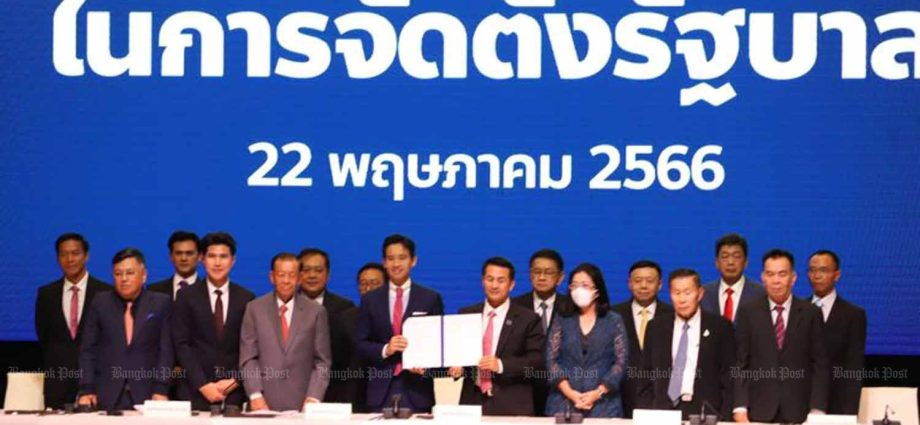
The Move Forward Party (MFP) and its seven coalition allies have signed a deal that lays out an ambitious reform agenda while committing to protect the Thai monarchy.
The eight parties made the vow in the memorandum of understanding (MoU) they signed on Monday evening as a guideline for the policies of the next government they planned to form together.
MFP leader Pita Limjaroenrat said the new government’s action plan would not affect the constitutional monarchy and the monarch’s revered and inviolable status.
A source said the seven coalition allies persuaded the MFP to include the monarchy protection element in the MoU before its evening announcement. The party that won the most House seats in the May 14 general election has been heavily criticised for saying it wanted to amend the lese majeste law, with some claiming the party’s ultimate intention was to revoke it.
The seven other parties that signed the MoU were Pheu Thai, Prachachart, Thai Sang Thai, Seri Ruam Thai, Fair, Plung Sungkom Mai and Peu Thai Rumphlang.
The agreement set forth an ambitious and sweeping agenda for reform.
The coalition would seek the drafting of a new constitution as soon as possible by people who would be directly elected.
The parties would push for the reform of the bureaucracy, the police, the armed forces and the justice system.
The new government would pass a same-sex marriage law, but one that would not demand compliance by people who consider it to be against their religion.
It would replace mandatory military conscription with voluntary recruitment.
The governing coalition would promote sustainable peace in southern border provinces based on human rights, co-existence of people with different cultures and the revision of authorities’ operations and enforcement of security laws.
It would tackle economic problems by increasing people’s income, decentralising budgetary authority to local administrations free of corruption, and improving the financial liquidity of small and medium-sized enterprises.
The eight parties would terminate monopolies in all industries, including the alcohol sector. The Muslim-dominated Prachachart Party expressed its disagreement on this issue on religious grounds.
The new government would promote fair land ownership rules and restructure power tariffs to cut the cost of living.
It would impose zero-based budgeting, introduce public welfare for people of all ages and quickly tackle abuse and trafficking of narcotics.
The coalition would issue a new public health ministerial order to relist cannabis as a kind of narcotic, and introduce a law to regulate cannabis use.
It would support farmers in organising groups to better protect their interests, promote sustainable fisheries, ensure workers’ rights and reasonable wages, improve the education system to reduce learning inequality and provide people with access to quality public health services.
The new government would also solve problems relating to ultra-fine dust (PM2.5) and greenhouse gases, promote the role of the Association of Southeast Asian Nations and keep the country’s balanced stance with world powers.
To tackle corruption, the eight parties agreed to disclose information from all government organisations and immediately eject any party members found involved in corruption.
The eight political parties signed and sealed the MoU at Conrad Bangkok Hotel on Monday evening – the ninth anniversary of the May 22, 2014 coup. The coalition unofficially consists of 313 House representatives-elect.

